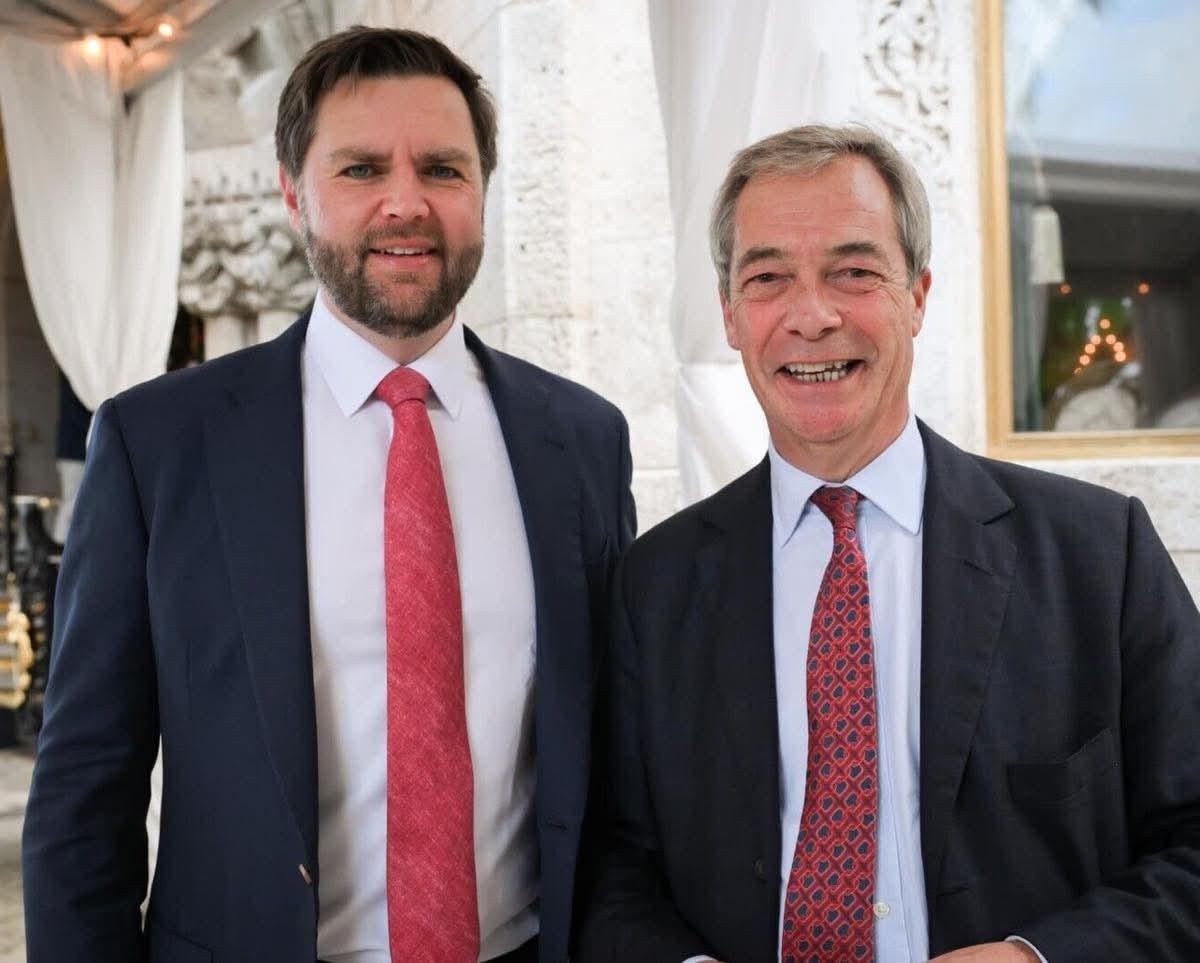A Vice President's English Summer
How JD Vance's 'Angloglobalism' Empowers the Special Relationship
Vice President JD Vance and Tom Skinner lining up at a BBQ in the Cotswolds was not on my 2025 bingo card. Vance meeting Skinner, a former contestant on The Apprentice and future contestant on Strictly Come Dancing, is an example of how the tide is changing. By choosing to holiday in England and to meet an exciting group of right-wing politicians including Nigel Farage, Vance's evident Anglophilia represents something very strategic and welcome. Vance’s love of our country embodies the kind of cultural diplomacy that has long sustained the Anglo-American alliance.
The Farage Factor
Vice President JD Vance this week met with Nigel Farage, leader of Reform UK. This wasn't merely a courtesy call between politicians—it was a strategic summit between two of the most influential populist voices on either side of the Atlantic.
Farage, the architect of Brexit, represents exactly the kind of anti-establishment energy that helped propel Trump and Vance to power. The timing couldn't be more significant; Reform UK's rising poll numbers suggest that Britain's political establishment may be facing the same populist reckoning that swept America in 2024.
The meeting between Vance and Farage represents more than diplomatic pleasantries. It signals the emergence of a coordinated conservative movement that transcends national boundaries, united by shared skepticism of globalist institutions, commitment to national sovereignty, and understanding that ordinary citizens have been betrayed by their political elites.
The Skinner Surprise: New Media, New Networks
Perhaps even more revealing was Vance's unexpected barbecue with Tom Skinner, the former Apprentice contestant who has transformed himself into a social media entrepreneur. Bosh!
"When the vice president of the USA invites you for a BBQ an beers, you say yes," Skinner posted, describing the evening as "once-in-a-lifetime" and noting that "He was a proper gent." But this casual gathering represents something more strategic than social media serendipity.
Skinner embodies the new conservative ecosystem; business-minded, digitally native, and unencumbered by traditional political hierarchies. His journey from reality TV to social media influence mirrors the broader transformation of conservative politics, where authentic voices can bypass legacy media gatekeepers and speak directly to audiences hungry for unfiltered perspectives.
Strategic Implications
These meetings signal several important developments for conservative politics on both sides of the Atlantic. First, they demonstrate that American conservatism is actively investing in relationships with Britain's rising populist movements rather than simply accepting whatever government happens to be in power in Westminster.
Second, they show sophisticated understanding of how political change actually happens in the digital age. By engaging directly with social media entrepreneurs like Skinner alongside established political figures like Farage, Vance is building relationships across the conservative ecosystem—from grassroots influencers to party leaders.
Third, these connections create informal channels for coordination and mutual support that transcend official diplomatic relationships. When Reform UK continues its rise in British politics, or when social media conservatives face censorship battles, they'll have established personal relationships with America's second-highest elected official.
The Long Game of Conservative Internationalism
Critics may dismiss these meetings as mere political tourism, but they reveal a sophisticated understanding of how conservative movements can support each other across national boundaries while respecting sovereignty. Unlike the globalist Left's top-down institutional approach, this represents organic coalition-building between like-minded movements.
The barbecue with Skinner and breakfast with Farage weren't accidents or casual encounters—they were investments in the kind of personal relationships that sustain political movements through electoral cycles and generational change. When British conservatives face pressure from establishment forces, when American policies need support from overseas allies, or when new challenges require coordinated responses, these personal connections will prove invaluable.



